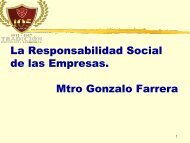0745685749 enemies democracy
Create successful ePaper yourself
Turn your PDF publications into a flip-book with our unique Google optimized e-Paper software.
36 The Inner Enemies of Democracy<br />
and America, they had the impression of a more radical<br />
superiority because they placed themselves at the<br />
summit of civilization. All peoples, Condorcet wrote,<br />
must ‘one day approach the state of civilization reached<br />
by the most enlightened peoples, those who are freest<br />
and least hampered by prejudice, such as the French<br />
and the Anglo-Americans’. This should lead to the<br />
gradual disappearance of ‘the immense distance that<br />
separates these people from the bondage of the Indians,<br />
the barbarity of the African tribes, and the ignorance<br />
of savages’. It was in the name of the ideal of equality<br />
that Condorcet wished to transform the lives of these<br />
distant populations: his duty as a civilized man was to<br />
free them from barbarism. But they themselves might<br />
not be aware of the good that awaited them, and might<br />
resist, in which case they should be forced, because, as<br />
Condorcet also said, the European population needed to<br />
‘civilize [them] or cause [them] to disappear’. 9<br />
The leaders of the most ‘enlightened’ countries would<br />
implement the dreams of Condorcet. England began to<br />
make inroads into the Indian peninsula in the last years<br />
of the century; for his part, Napoleon decided in 1798 to<br />
conquer Egypt. He harangued his troops at the moment<br />
of the attack: ‘Soldiers, you are about to undertake a<br />
conquest whose effects on civilization and commerce<br />
are incalculable.’ After the victory, he busied himself<br />
with modernizing the judicial system, communications<br />
and the economy, but as soon as the native population<br />
tried to regain its independence, he brutally repressed it.<br />
In Haiti, the news of the Revolution and the first decisions<br />
of the National Assembly encouraged the slaves to<br />
revolt; but in 1801, a French expeditionary force, led by<br />
the brother-in-law of Napoleon, Leclerc, landed on the<br />
island. He managed to arrest the rebel leader Toussaint<br />
Louverture, but could not stem the resistance of the<br />
former slaves, who wanted to rule themselves. Leclerc<br />
responded with drastic measures, writing to Napoleon:













